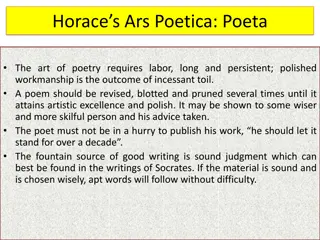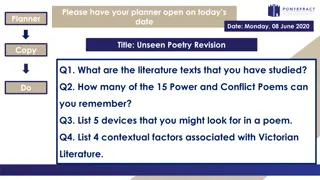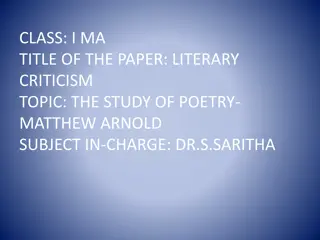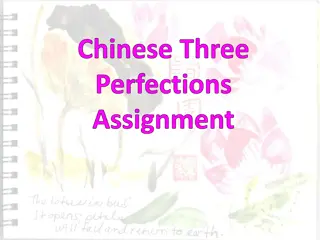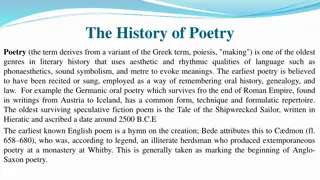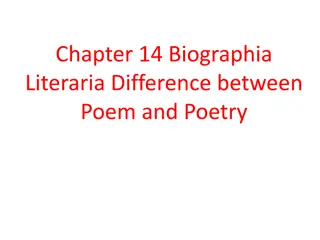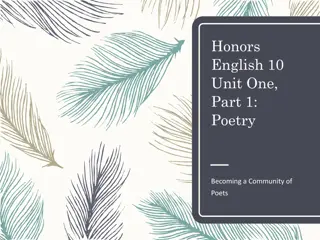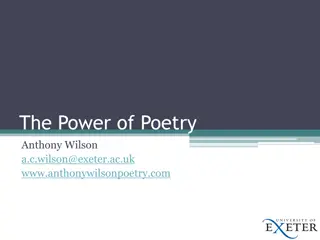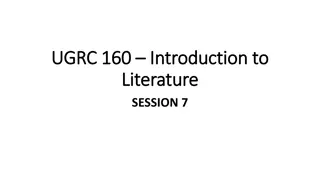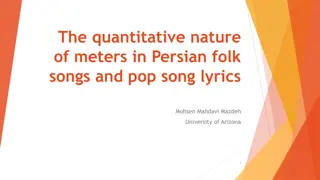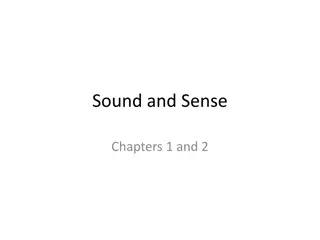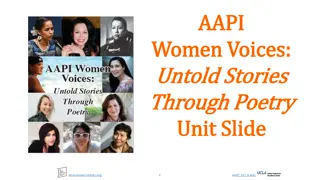
Adrienne Rich: Poetic Revolution and Feminist Commentary
Explore the life, themes, and poetry of Adrienne Rich, a revolutionary poet who challenged patriarchal norms and societal constructs. Rich's work delves into the roles of women, patriarchy, forging paths, suffering, and relationships through profound and impactful poetry. Her notable poem "Aunt Jennifer's Tigers" critiques the constraints of traditional roles and the repression faced by women. Delve into Rich's life journey and literary contributions that continue to inspire and provoke thought.
Download Presentation

Please find below an Image/Link to download the presentation.
The content on the website is provided AS IS for your information and personal use only. It may not be sold, licensed, or shared on other websites without obtaining consent from the author. If you encounter any issues during the download, it is possible that the publisher has removed the file from their server.
You are allowed to download the files provided on this website for personal or commercial use, subject to the condition that they are used lawfully. All files are the property of their respective owners.
The content on the website is provided AS IS for your information and personal use only. It may not be sold, licensed, or shared on other websites without obtaining consent from the author.
E N D
Presentation Transcript
2019 Adrienne Rich Adrienne Rich
Life and background: Life and background: Born in Baltimore, USA in 1929. Married Alfred H. Conrad, an economist and had three sons. Became more politically aware and worked for social justice. She was involved in the Women's Liberation Movement and was a strong feminist. This support was a catalyst in her feeling comfortable and confident enough for her to come out as a lesbian. Her marriage broke up after 17 years as a result of this and the unhappiness both she and her husband felt in the marriage. Her husband died by suicide soon after their split. She died in 2012.
Her themes: Her themes: 1. Role of women (their subjugation or suppression) 2. Patriarchy and oppression 3. Forging a path for yourself 4. Suffering and survival 5. Relationships
Her Poetry Her Poetry: : Draws on everyday experiences to make complex ideas accessible. Is refreshing and revolutionary - she wishes to bring about change. Wishes to change the way in which women see themselves, the way in which men see women, and indeed, the way in which men see themselves. Is confessional - grounded in her own life and experiences, especially in her marriage. Achieves impact through her distinctive use of metaphors. Transcends stereotypical feminism. Challenges patriarchal society. Rewards her reader with precious gems of vibrant images and shining symbols in her exploration of the difficulties of modern life. Uses contrast to shine the spotlight on modern dilemmas and to pose interesting questions. Speaks for both herself and her generations in the throes of great change. Is challenging, original and thought-provoking.
Aunt Jennifers Tigers Aunt Jennifer s Tigers Rich wrote this poem aged 21. Tiger (powerful) assumed male. Perfect stanza formation and rhyming. Strict iambic pentameter (5 stressed and 5 unstressed syllables). Conventional but there is a feminist quality. Aunt and Uncle are fictional but this does not diminish the power or impact of the poem.
Analysis Analysis Cleverly uses strict iambic pentameter metre to mirror the confined constrictions of the aunt's marriage Commentary on how women artists experience the restraints of traditional roles (e.g. wife, mother, homemaker) Marriage is where women sacrifice their creative abilities. They become repressed and overcome by the male dominant power. Women accepted this in the 1950's. 'Aunt Jennifer,' oppressed and repressed in a patriarchal male- dominated marriage, creates an alternate world. This unhappy woman whose 'fingers fluttering through wool' are the only expression of her personality, as she creates the antithesis of her situation, the proud 'tigers' which 'prance across a screen.' They are unlike the oppressed aunt, who is cowed beneath 'the massive weight of uncle's wedding band.'
The dominance of her husband is suggested by the capitalisation of 'Uncle.' - a symbol of a patriarchal society. The tigers are everything the aunt is not. They are symbols of power, they lead independent lives. This poem is making a stark statement about power and powerlessness. Even though the aunt in death seems to be subjugated, her hands are 'terrified,' her creation of the exotic tigers will live on, 'proud and unafraid.' The hands that fluttered and found 'even the ivory needle hard to pull' paradoxically made possible the very opposite - an image of certain power and pride.
The Uncle Speaks in the The Uncle Speaks in the Drawing Room Drawing Room Formal traditional approach Strict stanza structures Strict rhyming scheme Written early in writing career Overtly political statement Impersonal - realm of public Strict patterns mirrors the strict control of patriarchal and high class society.
Analysis Analysis The uncle talks of impending social and political unrest. His position of privilege and authority seems to be under threat and he addresses the issue. We are reminded of the fact that Rich and her husband were involved in social activism. The uncle is reluctant to accept any of these changes, so as he describes the events, he presents them in a negative light. He describes the group of people as a mob , as opposed to a crowd or a group of protesters. This is a derogatory term. Rich uses repetition of the word sullen , which is a word with negative connotations. This implies that the uncle has little time for these people. He considers them a mob even though all they are doing is standing in the square. The people seem to be standing and staring at the people in a position of power, including the uncle who is on the inside looking out at the restless people. The crowd is described as talking in bitter tones, again a term with negative connotations. They are not angry, but bitter. The crowd would appear to be contemplating violent action, but as of yet have not engaged in such actions.
Stanza Two The uncle tries to dismiss these actions as the mistakes of the lower orders of society. The use of the word follies is significant - it subtly characterises the uncle as upper class. It becomes clear that the flippant dismissal of the protesters seems to be a bit of a fa ade. While dismissing any notion of trouble, he is also conceding that precautions need to be taken and in the next few lines details how some material possessions could be damaged if there is unrest. The material possessions mentioned are possible symbols of wealth and status in society. Perhaps Rich is being quite clever here - she may be suggesting that their power is as fragile as the glass they are trying to protect. The uncle s priorities reveal how materialistic this class is. He is very mindful of the fact that there is glass in the houses that can be broken. The objects mentioned, such as crystal vases and chandeliers, are objects of the rich.
Stanza Three The uncle displays more arrogance in the face of the social unrest. There is a certain bravado/machismo in his speech as he tries to rally and dismiss yet again the notion of a threat. One senses, however, that these are merely empty words on the part of the uncle. His fears come to the surface once more, belying his bravado and underscoring the threat that really exists. The focus again falls on material possessions and family objects that are the symbols of power. There is a subtle hint here of some unrest in the past. The uncle refers to it as a storm, and one wonders whether it is a physical storm or a social and political storm he is referring to.
Stanza Four Once more the uncle tries to rally and falls back on the traditional notion tradition as a means of protecting power and privilege. He states that it is his and his class s responsibility to keep the torch lit for the upper class. However, it seems to be little more than empty rhetoric and is a weak argument for preserving privilege. They are the last line of defence between their great ancestors and the unruly mob that will destroy them.
Living in Sin Living in Sin Rich aged 26. Unmarried couples living together was highly disapproved at the time. Different format than previous poems (free verse). Start to see a change in her. A more intimate connection between poet and reader is established. Contrasts romantic expectations and realities of everyday life.
Analysis Analysis A young woman, blinded by the romantic idea of living with her artist boyfriend in a bohemian love nest expects that her life is going to be idyllic. Soon, however, the romantic haze of early love is dispersed by the reality of daily living - each dawn she wakes up to the same dull routine. This poem graphically describes a young woman's disenchantment with her partner and her domestic arrangements. 'No dust upon the furniture of love.' - a perfect scenario is deftly sketched, almost like a photographic display in a glossy home magazine, but the reality proves to be very different. The contrasting picture of real life is shown with a clever selection of details - the heavy thud of the 'milkman's tramp,' the cold light of the 'morning,' the leftovers of last night's meal...' She does not feel that she can voice a complaint about the situation. It would be a form of betrayal - 'Half-heresy.' At line 15 her partner emerges, oblivious to the unsatisfactory domestic situation. Her keen awareness is clearly contrasted with his total indifference.
He is relaxed, casual, he yawns, runs a few notes on the keyboard, shrugs at himself in the mirror and foes out to but cigarettes. He seems focused on himself, he seems to lack commitment - 'declared it out of tune.' He does not engage with the woman. Is this why 'living in sin' has lost some of its allure, Yet despite all this we see in line 23 the woman is not prepared to give up on her dreams The romantic illusion of a life 'Living In Sin' in Bohemian glory, is shattered by these carefully crafted contrasts. The thrilling life she has hoped to lead is contained in the alliteration of the letter 'p' and the adjective 'persian' - everything was supposed to be perfect, glossy, exotic. This poem is an aubade, a morning song for lovers parting after a night of passion with vows of never-ending love What a contrast to this is reality, vividly speaking of the gap existing between the idealised, romantic version of life as it really is
Trying to Talk with a Man Trying to Talk with a Man Rich aged 42. Her marriage to Alfred H. Conrad was failing. Title suggest difficulty in relationship from woman's point of view. Also shows how she is against violence. Lots lyrical/ musical effects. Metaphor used throughout.
Analysis Analysis The poem is rich in functional metaphor - not a spontaneous metaphor (poetic ornament to decorate or embellish). Rather, they are logical, throughout, functional and are sustained throughout the poem (embody the central idea of the poem or 'carry' the poem). Is a confessional poem about the poet s failing relationship with her husband set in the Nevada Desert which was used as a testing -ground for American nuclear bombs. The arid desert represents a dead marriage, a burnt out relationship. And just as bombs are tested in the desert, the marriage is being tested, and they find that just as bombs are exploded, their marriage is about to explode. The 'ghost town' of the desert, surrounded by silence, represents the silence of their marriage where they no longer have anything meaningful to say to each other. She remembers that the trip was an attempt to change the face of their weakening relationship
The speakers partner speaks of nuclear testing and the dangers of testing weapons, so as to steer clear of testing their own one-to-one relationship. The poem's ending signals the end of their relationship. It has been tried, tested and it has failed. The mood in the closing lines is of honest acceptance. He paces the floor but cannot confront what is really happening. When speaker courageously admits what their relationship is over he seems unable and ill-equipped to come to terms with it - men portrayed as inadequate, insensitive, ill-equipped to deal with emotions. His emotions are repressed. Talking might have solved the problem but the title suggests it is not possible to talk with a man and certainly not this man in particular.
From a Survivor From a Survivor Rich aged 42. Written following her break-up and her husband s suicide. Her father also died a few years previously. Charts the difficult stages of grief and survival. The poem is fragmented, which is symbolic.
Analysis Analysis This poem is quite confessional. It is honest, open and personal, telling us how she felt when she first married and how she feels how that her marriage is over. This is a confessional poem from a female perspective where Rich sets out how naive she and her husband were when they married. Looking back almost twenty years after marrying, she sees how her life has changed, or rather how she has changed her life. Her marriage is over, her husband is 'wastefully dead.' Now that her marriage is over she can see him objectively, can reflect on what his 'body could and could not do.' She has had the courage to change, to leave the unhappy marriage and now she says her life is 'a succession of brief amazing movements each one making possible the next.' She has discovered a whole range of new experiences. The passing of time has changed the speaker's life and her understanding of the marriage pact. The poem is divided into ten parts which could be said to suggest fragmentation, loss, fragility, a feeling of tentativeness.




